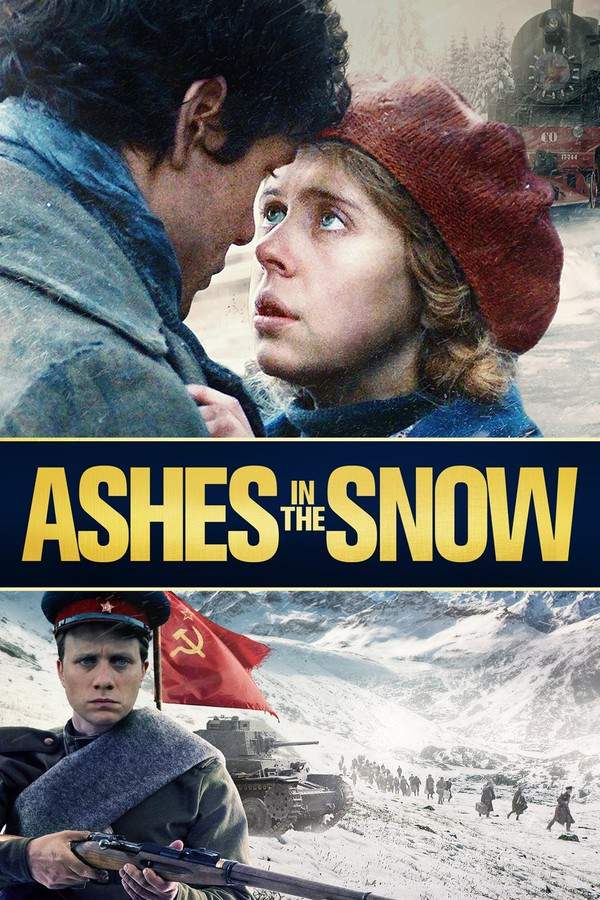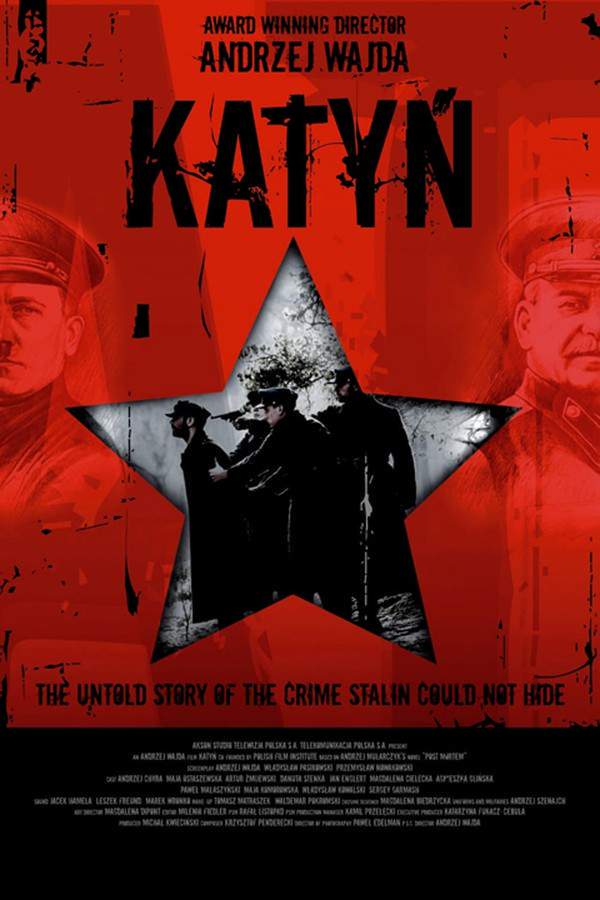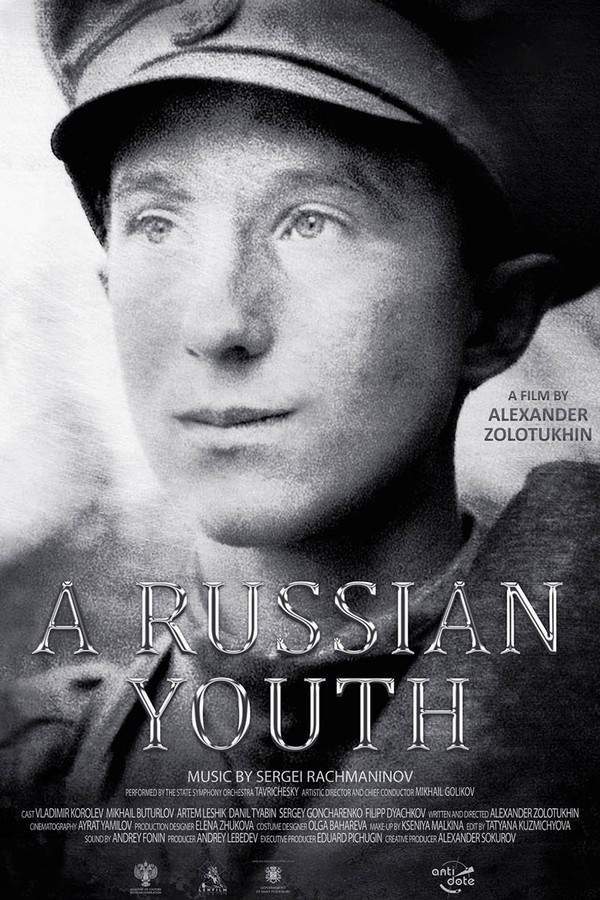
Ashes in the Snow 2019
Directed by

Marius A. Markevicius
Made by

Vertical Entertainment
Test your knowledge of Ashes in the Snow with our quiz!
Ashes in the Snow Plot Summary
Read the complete plot summary and ending explained for Ashes in the Snow (2019). From turning points to emotional moments, uncover what really happened and why it matters.
In the oppressive heat of 1941, sixteen-year-old Lina Vilkas is at a pivotal moment in her life, poised between artistic aspirations, the thrill of first loves, and the blissful joys of youth in her beloved Kaunas, Lithuania. However, her peaceful existence is abruptly disrupted when her father, Kostas Vilkas, becomes actively involved in the Lithuanian resistance against the Soviet regime, secretly crafting documents to assist those desperately seeking asylum from the turmoil engulfing the Baltic states. One fateful night, everything changes when Lina’s family, including her mother Elena, younger brother Jonas, and friend Andrius, is violently taken by the NKVD and deported to a stark gulag located in the bleak Altaysky region of Siberia.
Their harrowing journey is filled with a relentless torrent of brutality and hardship, as Lina and her family endure appalling conditions alongside other prisoners. Among them is Ona, a devastated mother who, consumed by grief over the loss of her baby, tragically provokes her captors into ending her life. Upon reaching the gulag, the ruthless Commander Komarov offers Lina and her fellow inmates a grim choice: a reduced sentence of 25 years for signing a confession. However, under the steadfast resolve of Elena, Lina and Jonas bravely refuse to succumb, facing even harsher realities at the hands of their oppressors.
Life inside the gulag devolves into a relentless cycle of labor and despair, as the inmates are forced to work tirelessly to fulfill backbreaking quotas, such as planting crops like potatoes that provide scant nourishment. Despite the desolation surrounding her, Lina discovers a source of solace in committing her experiences to art and written notes, interspersed with heartbreaking flashbacks of happier times. In a courageous effort to connect with her father, she cleverly embeds messages within her drawings, hoping to convey their plight.
As Lina bravely maneuvers through the treacherous backdrop of the gulag, she finds herself drawn to Andrius, who jeopardizes his own safety to smuggle essential provisions to the prisoners. Elena’s ingenuity shines through when Commander Komarov attempts to recruit her as a translator; she stands firm against collaboration with their captors. In a daring act of resistance, Lina creates a caricature that portrays Komarov as a monster, infuriating him and leading to the destruction of her artwork and messages.
Meanwhile, the NKVD guard Nikolai Kretzsky, an ethnic Ukrainian shunned by his Russian peers, becomes infatuated with Elena. After he learns of her husband Kostas’s murder at the hands of Soviet forces, he contemplates committing an act of violence against her. Yet, propelled by Elena’s undeniable courage, Kretzsky lashes out at a Russian guard, ultimately leading to his own promotion to Commander with a new assignment at a far-flung gulag on Trofimovsky Island in the Laptev Sea. As the authorities transfer Lina, Elena, and Jonas to this perilous site, they must brave the unyielding cruelty of their new reality.
As the harsh Arctic conditions continue to wear down the human spirit, the inevitable happens: Elena’s untimely death occurs due to the convergence of brutal circumstances and inadequate rations, poignantly illustrating the catastrophic results of neglect. This heartbreaking loss ignites a fire within Lina, compelling her to confront the oppressive forces that have devastated her family, demanding fair treatment and basic necessities for herself and her fellow inmates.
In a moment steeped in remorse, Kretzsky grapples with his complicity in the tragedy that befell Elena. Deeply moved by Lina’s unwavering spirit and the memory of her sister, he makes a profound choice to grant Lina and Jonas their freedom, safeguarding them from further suffering. This poignant act of redemption offers a bittersweet conclusion to the siblings’ excruciating journey.
As the film concludes, the camera captures an expansive view of Lina and Jonas walking along the windswept beach, the silhouette of their awaiting ship visible on the horizon. The once desolate landscape, a stark reminder of their confinement and suffering, has been transformed into a symbol of hope and new beginnings, as they set forth on an uncharted chapter of their lives, irrevocably changed by their harrowing experiences.
Ashes in the Snow Timeline
Follow the complete movie timeline of Ashes in the Snow (2019) with every major event in chronological order. Great for understanding complex plots and story progression.
Lina's Life in Kaunas
In 1941, sixteen-year-old Lina Vilkas enjoys a vibrant life in Kaunas, Lithuania, filled with artistic dreams, first loves, and the joys of youth. However, this idyllic existence is set against the backdrop of political turmoil as tensions rise in the Baltic region due to Soviet oppression.
Father's Resistance Work
Lina's father, Kostas, becomes involved in the Lithuanian resistance, crafting false documents for those seeking asylum from Soviet persecution. His actions put the family at risk, signaling the beginning of their descent into tragedy.
Deportation by NKVD
One night, Lina's family is violently taken by the NKVD, marking a catastrophic turn in their lives. Alongside her mother Elena, younger brother Jonas, and friend Andrius, they are deported to a gulag in the Altaysky region of Siberia, facing an uncertain future.
Brutality in the Gulag
Upon arrival at the gulag, Lina and her family face harsh living conditions and relentless brutality. They witness the tragic fate of Ona, a mother devastated by the loss of her baby, who is driven to provoke her captors, leading to her death.
The Grim Choice
In a display of cruelty, Commander Komarov offers Lina and her fellow inmates the option of signing a confession for a reduced sentence of 25 years. Led by her mother's strength, Lina and Jonas refuse, facing even harsher conditions instead.
Life in the Gulag
Life in the gulag becomes a desperate cycle of labor and despair as inmates toil to meet unbearable quotas. Despite the bleak reality, Lina channels her pain into art and writing, preserving memories of happier times and embedding secret messages for her father.
A Connection with Andrius
As Lina navigates the harsh gulag landscape, she grows closer to Andrius, who risks his safety to smuggle food to the prisoners. Their bond provides a glimmer of hope amidst despair, helping Lina to endure the chilling environment.
Elena's Resistance
When Commander Komarov tries to recruit Elena as a translator, she bravely refuses to collaborate with her oppressors. This act of defiance exemplifies her strength and determination to protect her family at all costs.
Consequences of Defiance
Lina's audacious act of creating a caricature of Komarov as a monster leads to the destruction of her artwork. This harsh punishment reinforces the dangers of resistance and the dire stakes faced by inmates in the gulag.
Kretzsky's Internal Conflict
Nikolai Kretzsky, an NKVD guard, develops an infatuation with Elena and is troubled by his role in the turmoil. After witnessing her strength, he turns against a fellow guard but faces the repercussions of his choices, ultimately being promoted and reassigned.
Transfer to Trofimovsky Island
Lina, Elena, and Jonas are forcibly moved to the harsher conditions of Trofimovsky Island in the Laptev Sea. The transfer compounds their suffering, forcing them to grapple with the brutality of their new reality.
Elena's Death
Tragedy strikes as Elena succumbs to the harsh conditions and deprivation in the gulag. Her death, brought about by a lack of rations and brutal circumstances, leaves a void in Lina's heart and ignites her desire for justice and humanity.
A Moment of Redemption
Kretzsky, haunted by Elena's fate, decides to protect Lina and Jonas after witnessing their suffering. He grants them freedom, offering a glimpse of hope amid the despair, and illustrating the complexity of human morality in such dire circumstances.
The Journey Back to Freedom
As the film concludes, Lina and Jonas walk along a windswept beach, gazing at a ship on the horizon that symbolizes their newfound freedom. The transformation of their once-desolate world into a landscape of hope marks a poignant end to their harrowing journey.
Ashes in the Snow Characters
Explore all characters from Ashes in the Snow (2019). Get detailed profiles with their roles, arcs, and key relationships explained.
Lina Vilkas
Lina is a sixteen-year-old girl who embodies resilience and courage throughout her harrowing journey. Her passion for art serves as both a means of escape and a tool for resistance against her captors. Driven by love for her family, she navigates profound loss and struggles to maintain hope amid immense suffering.
Andrius
Andrius is Lina's friend, characterized by his bravery and selflessness. He risks his safety to provide essential support to Lina and her family during their darkest moments. His bond with Lina represents a significant emotional anchor amid the chaos.
Elena
Elena is Lina's mother, depicted as a figure of strength and resistance against the oppressive regime. Her tenacity and refusal to collaborate exemplify her commitment to her family. Elena's eventual fate marks a poignant turning point in the narrative, underscoring the theme of loss.
Komarov
Commander Komarov is the ruthless figure representing the oppressive forces of the Soviet regime. His character embodies cruelty, often enforcing severe consequences for disobedience among the prisoners. His interactions with Lina highlight the power dynamics that further intensify the narrative's conflicts.
Kretzsky
Nikolai Kretzsky is a conflicted NKVD guard who experiences a transformative arc throughout the story. His initial complicity in the regime's brutality shifts as he grapples with his conscience, leading to actions that ultimately aid Lina and her brother. Kretzsky's character exemplifies the complexities of human morality in dire circumstances.
Ashes in the Snow Settings
Learn where and when Ashes in the Snow (2019) takes place. Explore the film’s settings, era, and how they shape the narrative.
Time period
1941
The year 1941 is marked by significant turmoil as World War II engulfs Europe, particularly affecting the Baltic states. During this time, the Soviet regime's oppressive actions lead to widespread deportations and resistance movements, deeply impacting the lives of individuals and families. This historical context shapes the narrative of Lina's struggle and resilience against inhumane conditions.
Location
Kaunas, Lithuania, Altaysky, Siberia, Trofimovsky Island, Laptev Sea
Kaunas, Lithuania serves as the backdrop for the early life of Lina, filled with artistic aspirations and youthful joys. The harsh Altaysky region of Siberia, characterized by its bleakness and oppressive conditions, is the site of their harrowing imprisonment in a gulag. Trofimovsky Island in the Laptev Sea represents the ultimate cruelty of Lina's experience, encapsulating the desolation of the Arctic environment they endure during their ordeal.
Ashes in the Snow Themes
Discover the main themes in Ashes in the Snow (2019). Analyze the deeper meanings, emotional layers, and social commentary behind the film.
🎨
Artistic Resilience
Art emerges as a powerful theme throughout the narrative, symbolizing Lina's resilience amid despair. Her commitment to her artistic expressions serves as a means to cope with the brutality of the gulag and to communicate with her father subtly. Despite the harsh conditions, Lina's creativity allows her to preserve her humanity and fight against her circumstances.
💔
Loss and Sacrifice
The theme of loss resonates deeply in Lina's journey, particularly through the tragic deaths of family members and fellow inmates. Their sacrifices highlight the severe consequences of oppression and the struggles faced by those resisting tyranny. This interconnectedness of loss drives Lina's determination to seek justice and maintain her family's legacy.
🕊️
Hope and Redemption
Amidst the darkness of their experiences, the theme of hope and eventual redemption shines through. Lina and Jonas's journey culminates in a promise of freedom and new beginnings, highlighting the enduring human spirit's capacity to hope. The poignancy of Kretzsky’s final act exemplifies the potential for change and mercy, resonating with the film's overall message of resilience.

Coming soon on iOS and Android
The Plot Explained Mobile App
From blockbusters to hidden gems — dive into movie stories anytime, anywhere. Save your favorites, discover plots faster, and never miss a twist again.
Sign up to be the first to know when we launch. Your email stays private — always.
Ashes in the Snow Spoiler-Free Summary
Discover the spoiler-free summary of Ashes in the Snow (2019). Get a concise overview without any spoilers.
In the winter of 1941, a quiet Lithuanian town is shattered as the tide of war sweeps families far from home. The landscape shifts from the sun‑kissed streets of Kaunas to the stark, frozen expanse of Soviet‑occupied Siberia, where a nameless bureaucracy forces ordinary people into an unforgiving new reality. The film’s atmosphere balances the raw chill of the tundra with a lingering, almost fragile, sense of optimism that persists beneath the ice.
Lina is a sixteen‑year‑old with a sketchbook tucked under her arm, dreaming of canvases and the bright future they promise. Growing up amid the love of her mother Elena and the protective bond with her younger brother Jonas, she finds herself thrust into a world where art becomes both refuge and silent protest. Their family’s quiet strength and the subtle tensions of adolescence are set against the larger, indifferent forces that have uprooted their lives.
Within the stark confines of the remote settlement, daily survival is measured in repetitive labor, meager meals, and the ever‑present cold. Yet, whispers of camaraderie echo through the barracks, and Lina’s drawings capture fleeting moments of beauty that the environment seeks to erase. The tone is one of austere resilience, where hope is a stubborn ember that refuses to be snuffed out, hinting at the possibility of reunion and a future beyond the endless white horizon.
Can’t find your movie? Request a summary here.
Movies with Similar Twists and Themes
Uncover films that echo the narrative beats, emotional arcs, or dramatic twists of the one you're exploring. These recommendations are handpicked based on story depth, thematic resonance, and spoiler-worthy moments — perfect for fans who crave more of the same intrigue.
Featured on this page

What's After the Movie?
Not sure whether to stay after the credits? Find out!
Explore Our Movie Platform
New Movie Releases (2025)
Famous Movie Actors
Top Film Production Studios
Movie Plot Summaries & Endings
Major Movie Awards & Winners
Best Concert Films & Music Documentaries
Movie Collections and Curated Lists
© 2025 What's After the Movie. All rights reserved.










